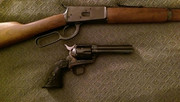JReed, we've had the same kind of luck this week. Thursday saw me shelling out for a new radiator and to have an oil leak fixed in my wife's car. Yep, that was my fun money but it sure wasn't fun...

Now then, as far as front load washers go I have a simple rule: I won't own one until they are forced upon me because there is nothing left on the market.
Why? Because appliance service is what I do for a living, primarily laundry equipment. Front load washers require more maintenance than the average top loader but 99% of the issues can be stopped at the homeowner level IF they are willing to do the maintenance. The problem is, most don't want to do it or don't know to do it.
Rules of the road for front load washers:
HE soap is required because it is designed to make less suds than "regular" detergent. Oversudsing can cause a leak from the door of the unit and it will eventually leave a residue that won't be washed out and starts to smell. You can probably get away with using smaller amounts of regular detergent but eventually someone will forget and you can end up with problems.
Make sure all pockets are emptied before washing. I pull a few bucks a week in loose change out of drain traps because people don't empty their pockets and the unit gets to the point where it will not drain. Also, a sharp or pointed object can damage the front gasket (not hard when the spin cycle is roughly 1000 rpm), causing a leak.
Don't try to wash rugs or blankets in one. Eventually one will come apart and clog the drain pump. The same will happen on a top loader but the fix is a whole lot easier on a top loader (except for Whirlpool, don't get me started...).
Don't wash pet bedding or anything with lots of pet hair. Not only will it eventually clog the drain pump but the hair gets stuck on the outside of the inner tub (the one you see moving) and on the inside of the outer tub (the one that keeps the water in). It builds up and starts to smell and there's not a thing to be done about it other than to separate the tubs for cleaning (wanna guess how much THAT costs?

) or replace the tubs (and you thought the first option was 'spensive).
Clean and dry the front gasket when you're done washing for the day. In fact it's best to leave the door open and let it air dry as well. That will help keep the gasket from mildewing and will keep funky odors to a minimum. When I ran in home service I had customers tell me they don't want to leave it open because they have small children who might crawl in it. I suppose teaching them to stay out of the washer is that hard? How do they keep them from touching the oven door?

Once or twice a year, clean the unit with a cleaner for front load washers. I use a product called Washer Magic but most any of them will work as long as you stay ahead of the power curve. Trying to use it to fix odor problems AFTER they've started is usually a loosing battle.
Rusty, offhand I would strongly suspect you have a venting issue. The best way to find out would be to remove the vent hose from the wall, clamp a nylon stocking over the end of the vent hose to catch any lint and try to dry a load of laundry. If this is a separate laundry room, close the door to keep the heat and humidity out of the rest of the house. If they are in an open laundry room, just wait until a cold day.

Probably 80% of the dryers that come into my shop with complaints of long dry time or not heating properly are due to vent issues.
If it dries better than it did before you either have a blocked vent, blocked duct work or a kinked vent hose. Being a new house doesn't mean there can't be vent issues. I ran lots of new neighborhoods and saw everything from vent covers painted over (blocking the vent cover from opening) to birds in the duct work (properly baked I might add). I was in the new home of a building executive one time and found the hot and cold were reversed in the wall. HIS OWN CREW had built the house.

If the drier still doesn't dry well it could be improper voltage at the wall (or a loose leg, etc), an improperly hooked up power cord (I see it weekly), an overload of laundry or an actual drier problem.
If these walls could talk, I'd listen to the floor.





